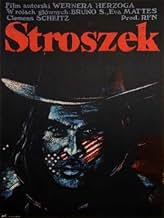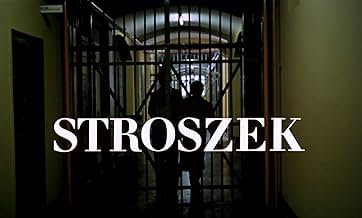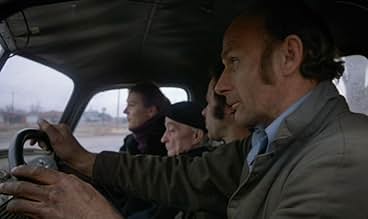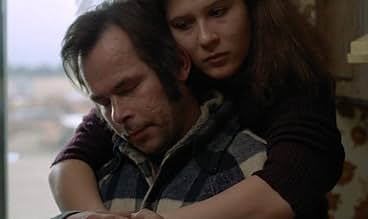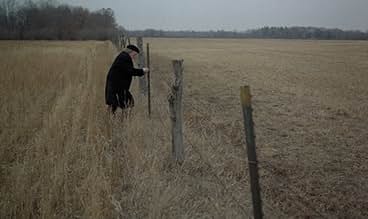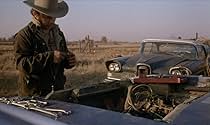अपनी भाषा में प्लॉट जोड़ेंIn Berlin, an alcoholic man, recently released from prison, joins his elderly friend and a prostitute in a determined dream to leave Germany and seek a better life in Wisconsin.In Berlin, an alcoholic man, recently released from prison, joins his elderly friend and a prostitute in a determined dream to leave Germany and seek a better life in Wisconsin.In Berlin, an alcoholic man, recently released from prison, joins his elderly friend and a prostitute in a determined dream to leave Germany and seek a better life in Wisconsin.
- पुरस्कार
- 2 जीत और कुल 2 नामांकन
- Scott
- (as Scott Mc Kain)
- Doctor
- (as Dr. Vaclav Vojta)
- Turk prisoner
- (as Yücsel Topcugürler)
- Trucker Pimp
- (बिना क्रेडिट के)
फ़ीचर्ड समीक्षाएं
A powerful, deeply moving film, 'Stroszek' is unique and unforgettable. It is a tender portrait of life on the margins of society that is most affecting. Herzog's characters are profoundly realistic creations and his story is full of poignancy. A movie about shattered dreams and dashed hopes, its themes are universal and its images captivating. At times, the precisely honed film feels improvisational or off-the-cuff; which is a credit to the unaffected nature of Herzog's writing and direction. Though there is a lot of humor in 'Stroszek,' it is ultimately a harrowing drama that speaks volumes about the human condition within our callous world.
'Stroszek' reunites Herzog with cinematographer Thomas Mauch, one of his more frequent collaborators. Mauch's naturalistic approach gives the film a documentary-like feel, which bolsters the faux-authenticity of Herzog's narrative. His juxtaposition of the constricting alleyways and streets of Berlin with the wide-open spaces of Wisconsin is arresting and effective. In the role of cinematographer, Herzog regularly uses Mauch, Jörg Schmidt-Reitwein or Peter Zeitlinger. The work of the latter two generally feature more stylizations and elaborate lighting, and possess a dream like atmosphere. For a human-centered drama like 'Stroszek,' the realism of Mauch's approach is most appropriate, as the haunting beauty of the resulting visuals prove.
The film boasts an atmospheric soundtrack, featuring songs by the likes of Sonny Terry and Chet Atkins. David Lynch has often stated that a successful film is comprised of "sound and image moving together through time," positing that, in scenes, visuals and sounds must complement each other; as they do masterfully throughout 'Stroszek'. Terry's 'Old Lost John' is utilized particularly well in one scene at the end of the film that sticks in the mind long after the credits have rolled (as it evidently did in Herzog's; he would re-use the song decades later to similar effect in 'Bad Lieutenant: Port of Call New Orleans').
Herzog has said that he doesn't like to "confront" his films alone during the editing stage, and until 1984, Beate Mainka-Jellinghaus assisted him during that process on all his cinematic endeavors. Their work for 'Stroszek' is flawless, and the film has a steady pace that never lets up. Additionally, the set design is muted, though highly detailed. Locations look long lived in, and the grittiness of their appearance adds to the overall narrative impact.
'Stroszek' stars Bruno S as the titular character. Partially inspired by himself, Bruno gives a tour-de-force performance of boundless depth, vulnerability and emotional perspicuity. He is someone you warm to immediately, and has your sympathies throughout. As does Eva Mattes- the only real professional actor involved- co-starring as Eva the prostitute. Her ease of performance and range leaves an indelible impression on the viewer, and you feel she really cares for Bruno. Also worthy of note is Clemens Scheitz's terrific turn as the elderly, comic Herr Scheitz and a troupe of performing chickens; who do most memorable work (despite the intense stupidity of their gaze).
A masterful and understated tragicomedy, 'Stroszek' is vintage Herzog. Boasting an insightful screenplay full of humor and drama in equal measure, the story is heartfelt and speaks of universal human truths. Seamlessly edited and shot with a distinct visual style, the film is timeless and terrific. Strongly acted and featuring an emotive soundtrack full of catchy tunes, this tale of broken dreams is one you'll find hard to forget.
"Stroszek" tells the fictional story of a real man named Bruno Stroszek. In other words, Stroszek plays himself in this eccentric film about a man who's released from prison, meets back up with his girlfriend and elderly buddy, and takes off for the fabled lands of....Wisconsin....to pursue the American dream. Anyone who's actually been to Wisconsin can probably guess how things play out for three immigrants with about three dollars between them. What follows is a series of vignettes that place Bruno in increasingly desperate straits and ends in an ambiguous finale that involves a ski lift and dancing chickens.
Welcome to the world of Werner Herzog, folks. "Stroszek" is not as compelling as some of Herzog's best, but it does inspire a sort of morbid fascination, if only because we take comfort that our situation isn't as bad as the one our characters find themselves in. But lest you are tempted to feel too sorry for Stroszek, he, like many of Herzog's protagonists, staunchly refuses to beg for sympathy, and faces one hardship after another with the dogged determination of a man who never fully understands how humble is his lot.
Grade: A-
There are certain messages in this film, and a probably important one is that it's hard to run away from trouble. Moving to a new city, or country in this case, doesn't always do it. When the prostitute leaves Stroszek for Vancouver, leaving him with a mortgage and no income, you know he's screwed. Beyond these elements, Stroszek is a movie with character but is not altogether impressive. Bruno Stroszek is interesting, but not as extraordinary as Kaspar Hauser. Ultimately, it leaves me a little underwhelmed.
Strange enough, the kitschy surreality of this film's music (a good example will be that iced lake radar search sequence) reminds me strongly of those 70's Classic Taiwanese "Beach" Dramas. You know, the kind where a pair of arms-outstretched love birds would run in slomo towards each other via opposite ends of a sandy seashore? I know, the cultural reference may be lost to non-Chinese readers and I apologise. But yes, this flick stirs and stimulates my free associative imagination with wild and insane glee. I kid you not, people. I kid you not.
However, major credits need be given to the lucidity and forceful presence of one Bruno S.
Sample below quote.
The Bruno to Eva: "And now comes the question. All my friends waited for me, but this is my best friend....my "Black Friend"(a piano). What's going to happen to my friend when Bruno goes dead someday? Where are these things and these instruments going to end up? What's going to happen to them. Someone must answer this for me." (And then, they just stared at each other, throughout and after.....)
Above affecting sequence punctuated the bittersweet vulnerability of one Bruno S. As a simple, slightly challenged man-child, Bruno had very limited human relationships all his life. As such, he guilelessly transfers his genuine feelings onto "placebo" objects. But despite of his checkered past (years of physical abuse and institutional upbringing), this socially inadequate man ably exudes generosity, kindness and unguarded honesty. Given half a chance, he will just as likely shower his unconditional love onto those whom he cares for, namely Eva. (As was shown in one scene set to the haunting tinkles of Moonlight Sonata). All in, Bruno is thus an exceptionally good man. But will there yet be more to this Bruno than meet the eyes? I dunno....
Throughout this film, I am captivated by Bruno's earnest glow; so refreshingly tender and devoid of artifice. In reaction to his search for meaning in life, love and other myriad mysteries (like "birds confiscators" or "speed-talking" men - don't ask.), Bruno's expressive face never lies. I felt immensely privileged to share in his bliss (or despair) at any given points in time. This fascinating creature tugged at my strings more often in this movie than the combined twitches of so many affected actors out there. I friggin' love this charming dude and hence, I cannot help but root for the guy. You go, Bruno!
Like the best of Herzog's works, Stroszek boasts of many scratch head-worthy moments. (Especially considering my having seen the Enigma of "Heart of Glass".) But these pecularities only serve to propel my viewing experience into mystical realms. For buried within its seemingly artful surfaces, lies aching balms of "cinematic capsules". They will randomly burst and engulf the inclined and willing. They will seep into one's consciousness and never let you go. I hence don't think I can ever erase the wonderous memories of those stolen moments already, from "Peddling Sabine" to "Infant Gymnastics", from "Not 4, but 5" to "$32". Most infamously, how can I not mention that "Dancing Chicken"? Brilliant!
At this point, I will like to urge all to venture forth into Herzog's film universe. For if you're willing, or foolhardy enough to take that plunge, you may yet discover a film like Stroszek to be ceaselessly beautiful and effortlessly moving.
क्या आपको पता है
- ट्रिवियाThe entire crew disliked the last sequence so much that director Werner Herzog had to shoot it by himself. Incidentally, he considers this scene the best he has filmed.
- गूफ़After Bruno, Eva and Scheitz buy a used car, they drive out to Wisconsin. The camera's shadow is visible on the car as Eva drives.
- भाव
[last lines]
Deputy Sheriff: We have a 10-80 out here, a truck on fire, we have a man on the lift. We are unable to find the switch to turn the lift off, can't stop the dancing chickens. Send an electrician, we're standing by.
- कनेक्शनFeatured in Century of Cinema: Die Nacht der Regisseure (1995)
- साउंडट्रैकOn the Way Down to Phoenix
Written and Performed by Chet Atkins
टॉप पसंद
- How long is Stroszek?Alexa द्वारा संचालित
विवरण
- रिलीज़ की तारीख़
- कंट्री ऑफ़ ओरिजिन
- भाषाएं
- इस रूप में भी जाना जाता है
- La balada de Bruno S
- फ़िल्माने की जगहें
- Plainfield, विस्कॉन्सन, संयुक्त राज्य अमेरिका(hold up on North Street)
- उत्पादन कंपनियां
- IMDbPro पर और कंपनी क्रेडिट देखें
बॉक्स ऑफ़िस
- दुनिया भर में सकल
- $3,451

